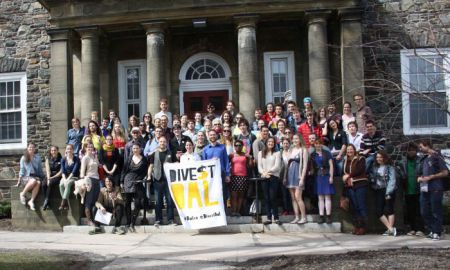K'JIPUKTUK, HALIFAX - Dalhousie could become the first Canadian university to pull its investment from the fossil fuel industry.
“It’s hypocritical for an institution of higher learning and research to be projecting itself as sustainability leader while it still has holdings in the fossil fuel industry,” said Emilia Belliveau-Thompson, co-organizer of Divest Dal — a group dedicated to campaign for university’s fossil fuel divestment.
The university’s board of governors recently announced they would begin to investigate withdrawing the $20.3 million of the school’s endowment fund from a number of the world’s leading coal, oil and gas companies.
“I’m very excited,” Belliveau-Thompson said in an interview Friday. She describes how the board’s decision comes after a 14-month campaign by students, faculty, alumni and community members, including a petition signed by more than 800 supporters who believe the university should break all ties with fossil fuel companies.
“This is a huge step forward for us," she says.
The board has agreed to present an update at its next meeting in October, and then table a formal report in November. That's the time to put the question of divestment to a vote, Belliveau-Thompson believes.
Dalhousie currently has holdings in 35 of the world's top 200 oil, gas and coal corporations, according to a report by the university’s investment committee released in April.
In moving forward Belliveau-Thompson says the campaign will continue to provide the board with research about the impact of fossil fuels on climate change in order to ensure that “a decision is made and a vote happens.”
To her, a recent graduate of Dalhousie’s environmental sustainability program, it is a matter of ethical and social paramount for the university to help build an environmental consciousness community.
“Dal is in many ways becoming more and more of a leader is sustainability,” she says. “I would really like to see their investments reflect that,”
She sees divestment as only one step towards Nova Scotia’s climate change strategy and believes real progress begins with policy change and increased public awareness about the urgency of global warming.
“(Divestment) is not the only tool we should be using, but it is one of many that will take us in the right direction," Belliveau-Thompson says.
The divestment movement, a world-wide campaign that encourages all universities and institutions to go “fossil free”, has sparked a number student-led organizations across North American to lobby for schools to freeze all investments and divest ownership from fossil fuel companies within five years.
The University of Victoria, the University of Toronto and the University of New Brunswick are among the many Canadian universities with divestment campaigns.
See also:
Dal applauds sustainability accomplishments
Tensions flare over fossil fuel divestment at Dal



